- Home
- Nathan Lowell
Home Run Page 11
Home Run Read online
Page 11
“I remember,” Natalya said.
“So we need to get to Pop-pop and figure out what he wants to do, but we need water, food, air, scrubber cartridges, and—probably—fuel pretty damn quick.”
“Where’s the nearest station with comms?” Natalya asked.
“We’d need to check the navigational database on the Peregrine but it can’t be too far away. We’re halfway between Mel’s and the Ranch. Either of those is probably only a couple of days each way.”
“Agreed.”
Zoya took a deep breath and looked at the deck, turning away from the dock exit and looking at the Peregrine. “What do we do about Bean?”
Natalya shook her head. “I don’t know. He seems a little out of it.”
“To be fair, he comes and goes. Sometimes he seems like he’s on the ball but then he drifts off into space. I know he’s had a lot of changes to deal with, but do we sent him back on the next ship?” Zoya sighed and shook her head. “He’s all but useless, and his tangents ... ‘If we only had a smelter we could make our own metal?’ Really?”
“He has a point,” Natalya said.
“That’s the thing. He does, sort of, but we can’t just pour metal into ingots and have it be useful. It needs to rolled into sheets or poured or printed or something. This station didn’t have that level of processing before it blew up. It was a smelter. In company terms that meant a grinder married to a smelter that turned out ingots and bars of finished metal. The company has specialized facilities for alloying and handling exotic metals. We don’t do it at the smelter and those alloy plants don’t smelt. Unless we branched out while I wasn’t looking, Usoko doesn’t do metal forming. We just supply the raw, purified metal stocks.”
Natalya nodded. “One thing bothers me.”
“Only one?” Zoya asked.
“Well, no, but where are all your smelters and processing mills?”
“Mostly in Margary, but there are operations in Ciroda, Tellicherry, and even Diurnia.”
“According to what Pittman said, there’s at least one more here in the Toe-holds,” Natalya said.
“I’m with you so far.”
“How far do you haul the raw metal from the smelter to the mills?”
Zoya frowned and bit the corner of her mouth. “Not more than one jump.”
“How far is this place away from a mill?”
“By freighter?”
“Yeah. If we had the old Melbourne Maru here with her juiced-up Burlesons? How many jumps?”
“What did it take us to get to Siren? Ten? Twelve?” Zoya asked.
“Something like that. It was fast but it was still a lot of jumps,” Natalya said. “We don’t know what they were doing with the metal. But if there’s enough ore to justify a smelter here in Toe-Hold space ... ?”
“And if all the growth in the Western Annex is out here?” Zoya’s eyes widened and she looked toward the common room. “It would need some kind of genius structural engineer to drive that design work.”
Natalya shrugged. “Something to think about.”
“All right. Priorities. Let’s check the navigational database.”
Chapter 21
Smelter Seventeen:
2368, February 9
Zoya shook her head. “I don’t like splitting up like this.”
“It’s only for a couple of days,” Natalya said. “We could both go, but we can’t leave Bean here alone. You could take him with you but there’s no sense in dragging him there and back. We can’t leave the system without a representative of Usoko Mining. While that should be you, you’re also the only one who can talk to your grandfather.”
“I could write the message and you could go,” Zoya said. “It makes more sense if I’m here and you’re the messenger.”
“You’ll want to wait for a reply,” Natalya said. “It’s no good my going over there and coming right back without getting his response. Besides, you’re the one best able to deal with it if his reply is off base somehow.”
“At this point, you know as much about this operation as I do,” Zoya said.
“But I’m not his granddaughter. I’m not the heir apparent.”
“It’s your ship. What if I break it?”
“Don’t come back,” Natalya said, her voice flat and cold.
Zoya looked at her, mouth open and eyes wide in shock.
Natalya laughed. “Kidding. If you broke it, you probably couldn’t come back. That would be bad. Much as it pains me to admit—you’re the better pilot by a wide margin. You’ve been doing most of it for weeks now. The only difference is that I’ll be here instead of making your coffee and feeding you chicken curry.”
Zoya slugged her on the shoulder.
Natalya laughed. “Did you learn anything about this station you’re going to?”
Zoya shook her head. “The database entry is all I could get and that was so terse as to be pointless.”
“Well, it’s not new. It’s been around for a while and it’s not shy because it’s listed in Inky’s updates,” Natalya said. “Weird name, though.”
“Well, it’s not that weird. There’s Port Newmar.”
“Yeah, but that’s named for the founder,” Natalya said. “You ever hear of anybody named Lumineux?”
Zoya grinned at her. “Absence of evidence?”
Natalya snorted. “All right. You got me on that one.”
“It’s gonna feel weird,” Zoya said.
“Stop dragging your feet. We need that message to get out.”
Zoya nodded. “You’re right. Later.” Zoya climbed the ramp and cycled the lock without looking back.
Natalya returned to the common room and closed the airtight door.
“She ready?” Ahokas asked.
Natalya nodded.
“You can watch from topside.”
“Thanks,” Natalya said and headed for the stairwell while Ahokas managed the dock controls.
The heavy pumps vibrated the whole platform as they siphoned the air out of the dock. Natalya felt like they were sucking part of her out as well. She crossed to the armorglass observation deck and watched as Zoya slid the Peregrine into space, yawed the tiny ship onto its new heading, and goosed it away, the pale flames flickering in against the dark. It seemed so small.
“You think she’ll get us help?” Bean asked, stepping up behind her.
Natalya nodded. “Oh, yeah. It just feels weird.”
“Watching your ship fly off without you?”
“No, seeing my friend fly off without me.” She looked at Bean. “We’ve been joined at the hip for something like ten stanyers.”
“And you’re not a couple?”
“A bunch of people seem to think so, but no.” Natalya looked out to where the tiny point of light flickered in the distance. “It’s curious. She’s the sister I never knew I needed but we’ve only really gotten to know each other since we graduated from Port Newmar. We lived in the same room for stanyers, but didn’t occupy the same place until we came to Toe-Hold space.”
He nodded, following her gaze out into the dark. “Lucky,” he said.
“What? That we’ve been together so long?”
“No,” he said. “That you found each other at all.”
They stood there staring for a long time.
“Can I ask you something?” Natalya asked, staring straight ahead.
“I guess.”
“Are you all right?”
He rasped out a bitter-sounding chuckle. “I have no idea. In the last—what? Ten days? I’ve been told I’m going to die, told I’m going to live, plucked from the clutches of TIC—where I still don’t know if charges are pending should I return to the CPJCT. I’ve jumped into what amounts to a war zone in a part of space I always thought was a euphemism, almost been roasted alive while you were nearly killed a few meters away, charged with—I think—building a new station from scratch with neither materials nor labor while facing potential starvation or asphyxiation and the possibility tha
t if I get it wrong dozens of other people will die with me.” He looked at Natalya. “Did I miss anything?”
Natalya shook her head. “You forgot that you managed to work through your shock at having your world turned inside out, helped save a woman’s life, threw out ideas that might just be the salvation we’re looking for, and helped to keep us grounded in the mission we’ve been sent here to do.” She turned her head to look at him. “Even when we really didn’t understand what you were telling us.”
His eyes widened.
Natalya gave him a small smile and looked back at where the flickering flame no longer showed against the velvet darkness. “You always wanted to be a structural engineer?”
“Yeah,” he said. “Kind of an engineering nerd since I was very young. I used to play those building simulation games incessantly when I was a kid. You?”
“I started working on ships when I was old enough to hand the tools to my father. I can’t imagine doing anything else.” She paused. “We need you to make us a plan.”
He nodded. “What kind of plan?”
“A metal fabrication plan. Full vertical integration from ore to final metal.”
“What kind of final metal?”
“Rolled plates, bars, rods, ingots.”
He nodded again.
“Start with logistical support for eighty people. Shelter, air, food, water, entertainment. Docking for ten barges, two freighters with ten-meter rings, and two haulers. Build out to ore with one grinder that can handle one barge at a time to start, move to smelting capacitor to take that ground ore, feed the smelted metal into the processing plant. Design in expansion to handle just-in-time processing for ten barges at a time.”
He laughed. “That all?”
“No, make sure that the logistical support has the capacity to handle each stage as it comes online and finish that first stage of logistical support in the next three weeks.”
He gazed into the darkness for a long time. “Nope,” he said.
“Nope?” Natalya asked.
“As I understand it, the priority is not capacity. It’s capability.”
Natalya looked at him. “Explain.”
“We’ve got people and ships out there who’ll need to come back here to replenish critical supplies before they run out.”
“So far, so good,” Natalya said.
“We don’t need to support eighty people. We just need to be able to make it so the people who are already here can survive in their own ships.”
“Yeah,” Natalya said. “That’s the first problem.”
“We need residential capacity for the people needed to run those support functions first but it needs to be expandable to include the construction teams necessary for building out the first production. We can stash the ore until it’s ready for processing, even if it means keeping the barges here until we can unload them. As long as we keep the crews alive.”
“Keep going.”
“The chicken-egg problem is that we need someplace for the construction crews to live while they build out the new base where they’ll be able to live while they’re constructing the rest.”
Natalya stared out into the darkness while she pondered that. “If we had a ship big enough for them and their equipment, they could live on that.”
He nodded. “Or pressurize an empty can for staging materials.”
“I like that. I’m pretty sure we have an empty can in the yard.”
“I think there’s a better choice.”
She looked at him. “Which is?”
He nodded toward where the crippled Barbell drifted slowly in space. “If I followed your conversation earlier, that can is either filled with food or filled with finished metals. Even if we can’t use the finished metals yet, it’s worth checking because we sure as hell could use the food.”
Natalya nodded. “The trick would be grabbing the can without it being released by the ship.”
“If there’s a way, Kim would know it and there are still cargo handlers in the docking bays. I don’t know how many it takes but I counted four.”
“You looked?”
“Nothing else to do.”
Natalya stared into the void while she let the conversation percolate through her gray matter. After several long moments she asked, “You got a brother?”
“Nope,” he said. “Only child. Parents work on the orbital in Dunsany Roads.” He paused and glanced at Natalya. “But I might have found a sister I never knew I needed.”
Chapter 22
Port Lumineux:
2368, February 9
Zoya didn’t really know what to expect. It wasn’t the first time she’d jumped the Peregrine into an unknown station in Toe-Hold space, but it was the first time she’d done it alone. The process of it, the mechanics of it, all felt very familiar. The feeling of it, of being alone in the ship listening to each rumble and tick, every motor that came on or shut off, gave her an odd feeling at the back of her neck. She plugged in the speakers and dialed the hailing frequency.
“Peregrine, Port Lumineux. You have entered a restricted sector. State your business. Over.”
The sudden hail startled her. She’d barely had a chance to link in the mic. “Port Lumineux, Peregrine. Request emergency assistance. Over.”
“Peregrine, Port Lumineux. Please state the nature of the emergency. Over.”
“Port Lumineux, Peregrine. A station has been destroyed. All outgoing comms are down. I need to notify the owners. This is the nearest station on the charts. If you have outgoing communications, I request permission to send a message. Over.”
She reached over and fired up the High Tortuga interface and pinged the system for a buoy.
“Peregrine, Port Lumineux. Approach vector sent. Hold at the outer markers. Over.”
Her console bipped with an incoming course and location marker.
“Roger, Port Lumineux. Vector received. Hold at outer markers. Peregrine, out.”
She sat there for a couple of moments but no received no additional communications.
She shrugged. “Well, they’re terse but at least they’re not rude.”
She watched the ping timer progress. If the buoy was far away, it might take a while. She glanced down at the long-range scan as it painted in the system ahead of her. She frowned at the display. The chart entry only listed three major celestial bodies and four asteroid bands. The ephemeris attached to the system showed the three majors currently on the far side of the primary and the belts all inside the station, which orbited the primary, much like Margary. Her long range showed a chevron-shaped collection of very large somethings a few million kilometers off to her port side. She knew they were too far to see with the naked eye but looked in that direction anyway.
She tagged the object at the point of the chevron and invoked a tracking program. They looked like ships. If they were, they were the largest ships she’d ever seen.
Her search ping popped up a hit. The system had a buoy and it was live. She looked at the traffic headers stacked and took a chance by squirting her report directly to the buoy using her HTHC credentials.
“Peregrine, Port Lumineux, over.”
The sudden hail startled her.
“Port Lumineux, Peregrine, over.”
“Peregrine, Port Lumineux. Cease all communications not on authorized voice channels with Port Lumineux, Lumineux Local or other designated frequencies while in system. Failure to comply carries significant penalties up to but not limited by seizure of your vessel. Over.”
“Port Lumineux, Peregrine. Roger. Speak only when spoken to. Over.”
“Peregrine, Port Lumineux. Snarky but essentially correct. Port Lumineux, out.”
She stared at the speaker. “Did he just make a joke?”
A second thought chased the notion out of her head and sent a chill down her back. She glanced at the buoy interface. The tight beam signal was still on its way to the buoy and wouldn’t arrive for some seconds yet. How did they know so quickly?
<
br /> The cockpit didn’t have much lighting when underway. She killed what little existed and began scanning the stars gleaming in the dark. She tickled the yaw and started a horizontal spin, staring out through the armorglass. When she’d made it all the way around horizontally, another tickle killed the rotation and started a tumble, spinning the ship so she could see above, behind, and below. About 130 degrees into the rotation, she spotted the shadow, a dark spot against a random distribution of distant stars. As she watched, stars appeared to wink out along one edge of the shadow and emerge from the opposite one. She checked her short range and saw nothing on it. The shadow had to be close enough that she should have it on short range. Holding a cloak like that wasn’t supposed to be possible. She started blinking the forward spots in Morse code. She spelled out A-H-O-Y before turning back to face along her course track and wondering just what kind of trouble she’d gotten herself into.
Chapter 23
Port Lumineux:
2368, February 10
Zoya zeroed out her vector at the outer markers as indicated on the navigational advice she’d received. She didn’t have to wait long.
“Peregrine, Port Lumineux, over.”
“Port Lumineux, Peregrine, over.”
“Peregrine, Port Lumineux, shift to bravo-four-four to contact Lumineux Local. Over.”
“Port Lumineux, Peregrine. Roger bravo-four-four to contact Lumineux Local. Peregrine, out.”
She adjusted the comms and tried to remember what bravo-four-four was. It wasn’t the frequency they’d been using in Toe-Hold space but it tickled something in her brain. She just couldn’t bring it forward.

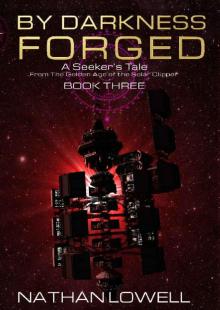 By Darkness Forged (Seeker's Tales from the Golden Age of the Solar Clipper Book 3)
By Darkness Forged (Seeker's Tales from the Golden Age of the Solar Clipper Book 3) The Wizard's Butler
The Wizard's Butler Cape Grace
Cape Grace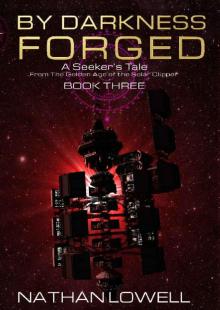 By Darkness Forged
By Darkness Forged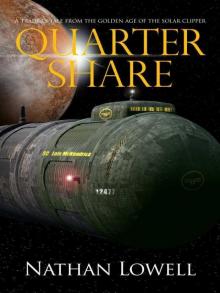 Quarter Share
Quarter Share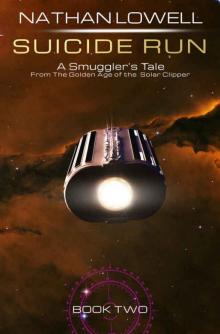 Suicide Run (Smuggler's Tales From the Golden Age of the Solar Clipper Book 2)
Suicide Run (Smuggler's Tales From the Golden Age of the Solar Clipper Book 2)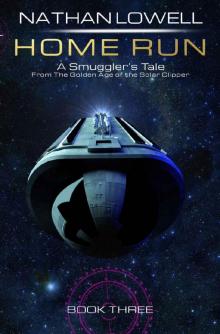 Home Run (Smuggler's Tales From the Golden Age of the Solar Clipper Book 3)
Home Run (Smuggler's Tales From the Golden Age of the Solar Clipper Book 3)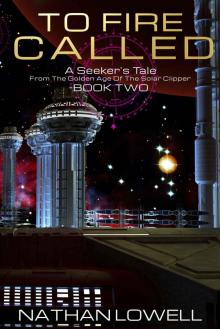 To Fire Called (A Seeker's Tale From The Golden Age Of The Solar Clipper Book 2)
To Fire Called (A Seeker's Tale From The Golden Age Of The Solar Clipper Book 2)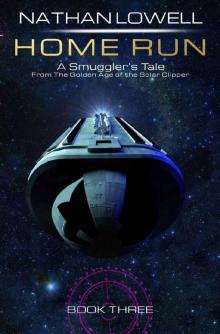 Home Run
Home Run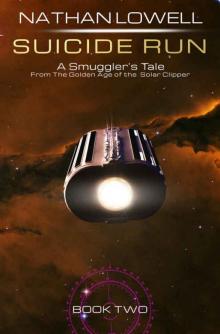 Suicide Run
Suicide Run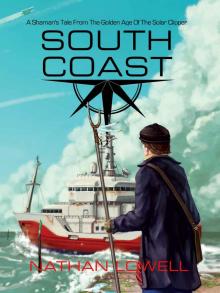 South Coast (Shaman's Tales From The Golden Age Of The Solar Clipper Book 1)
South Coast (Shaman's Tales From The Golden Age Of The Solar Clipper Book 1)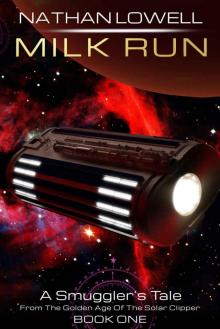 Milk Run (Smuggler's Tales From The Golden Age Of The Solar Clipper Book 1)
Milk Run (Smuggler's Tales From The Golden Age Of The Solar Clipper Book 1) Ravenwood (Tanyth Fairport Adventures)
Ravenwood (Tanyth Fairport Adventures)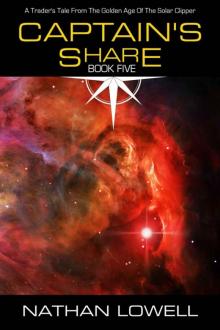 Captain's Share (Trader's Tales from the Golden Age of the Solar Clipper)
Captain's Share (Trader's Tales from the Golden Age of the Solar Clipper) Owner's Share (Trader's Tales from the Golden Age of the Solar Clipper)
Owner's Share (Trader's Tales from the Golden Age of the Solar Clipper)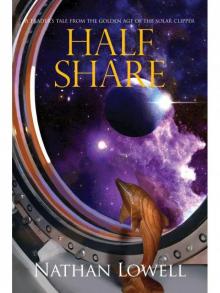 Half Share
Half Share The Hermit of Lammas Wood
The Hermit of Lammas Wood Ravenwood
Ravenwood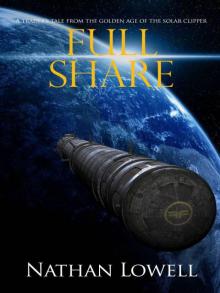 Full Share
Full Share A Light In The Dark (Tales of the Deep Dark)
A Light In The Dark (Tales of the Deep Dark)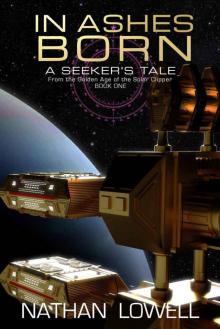 In Ashes Born (A Seeker's Tale From The Golden Age Of The Solar Clipper Book 1)
In Ashes Born (A Seeker's Tale From The Golden Age Of The Solar Clipper Book 1)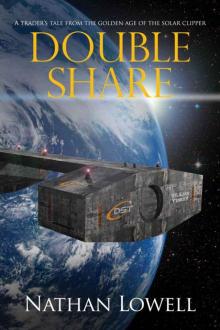 Double Share: Solar Clipper Trader Tales
Double Share: Solar Clipper Trader Tales Zypheria's Call (A Tanyth Fairport Adventure)
Zypheria's Call (A Tanyth Fairport Adventure)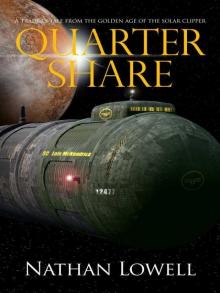 Quarter Share attftgaotsc-1
Quarter Share attftgaotsc-1